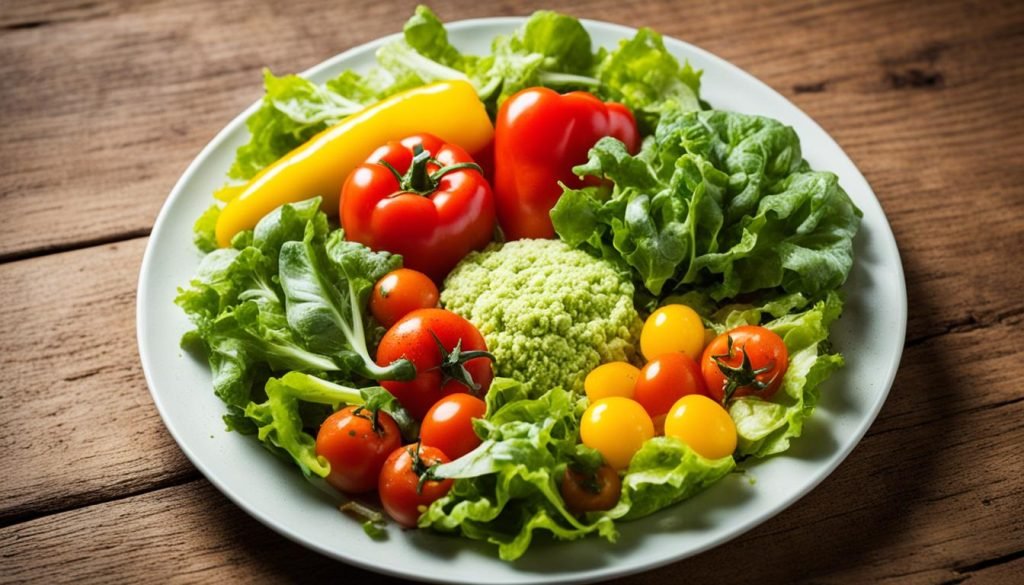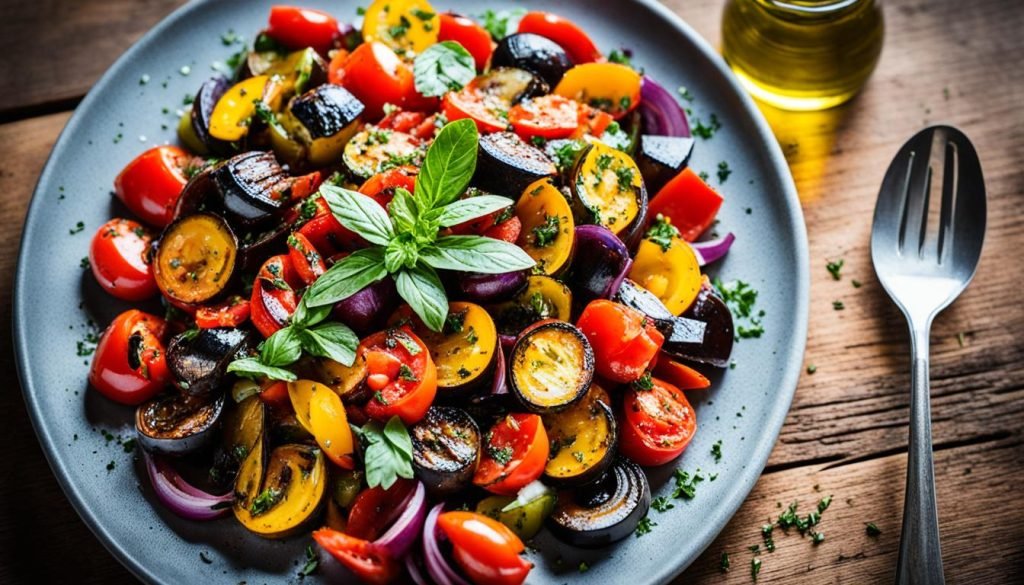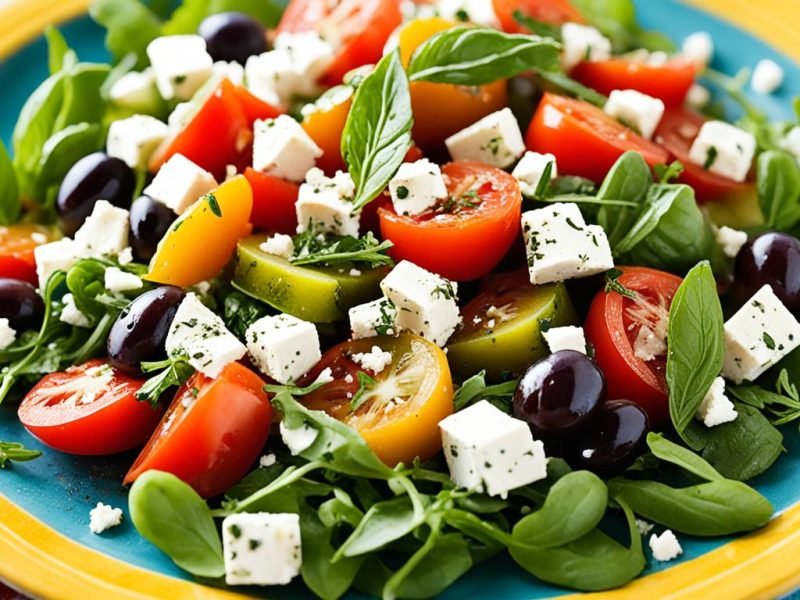It’s an unfamiliar but telling figure: over 80% of travelers to North Africa experience some form of gastrointestinal discomfort, with a significant portion often debating the wisdom of eating salads during their visits. In the heart of Tunisia, where the sun beats down on markets brimming with fresh produce, the allure of a crisp, cool Tunisian Salad is undeniable. Yet, for many who are unadapted to the region’s diverse microbial landscape, this seemingly harmless choice can be a gamble with traveler’s well-being. Within Tunisian cuisine, the status of salads is both prominent and traditional, serving as a staple in the everyday eating habits in Tunisia. However, with traveler’s health in question, understanding the broader context of salad in Tunisian culture becomes not just a matter of palate but of precaution too.
Key Takeaways
- Salads hold a central place in Tunisian culture, often featuring as a key component in meals.
- Tunisian cuisine is renowned for its use of fresh, vibrant vegetables, making salads a popular choice.
- Traveler’s health concerns highlight the importance of being cautious with raw salads due to the risk of traveler’s diarrhea.
- Understanding local eating habits in Tunisia can help travelers make informed dining decisions.
- Cooked vegetables are a safer alternative for those with sensitive stomachs, still allowing an authentic taste of Tunisian food traditions.
- Some preventive measures can enable enjoyment of Tunisian Salad without undue worry.
Risks Associated with Eating Fresh Salads in Tunisia
While Tunisia’s exceptional flavors and dishes beckon the adventurous food lover, caution must be taken, particularly with the consumption of fresh vegetables. A common condition experienced by tourists, often associated with eating raw produce, is Traveler’s Diarrhea—a gastrointestinal disruption triggered mainly by bacteria unfamiliar to the visitor’s digestive system.
Understanding Traveler’s Diarrhea
Contracting Traveler’s Diarrhea can put a damper on any holiday, and the consumption of fresh vegetables in Tunisia is a known risk factor for this ailment. Fresh salads may contain microorganisms that the traveler’s gut has not previously encountered, potentially leading to this inconvenient and uncomfortable condition.
Personal Accounts of Sickness from Salads
Evidence of the health risks envelopes tales told by those who experienced the dismay of contaminated food firsthand. Vigilant travelers may recount stories of regrettable brushes with leafy greens that turned their dream vacation into a bout with nausea, diarrhea, or worse.
Contamination Sources in Fresh Produce
Critical examination often reveals that the problem lies with frugal rinsing and handling of produce. Inadequate cleansing processes or the use of impure water leads to the presence of pathogens on fresh produce, making unsuspecting fresh vegetables a repository for organisms that cause Traveler’s Diarrhea. Therefore, understanding the sources and modes of contamination is instrumental in safeguarding against the health risks in Tunisia related to dietary choices.
The Culprits: Harmful Bacteria in Unwashed Vegetables
Understanding the potential hazards lurking in unwashed vegetables is critical for safeguarding health, particularly when exploring Tunisian food traditions. Various pathogens, which can lead to foodborne illnesses, often find a breeding ground in produce that has not been adequately cleaned. These harmful bacteria and parasites are a primary concern for anyone adamant about food safety while traveling.
Notorious amongst these microbes are:
- Norovirus, which is highly contagious and can trigger sudden onset of vomiting and diarrhea
- E. coli, associated with a spectrum of conditions from mild intestinal discomfort to severe dehydration and kidney failure
- Salmonella, often responsible for severe gastroenteritis and complications such as reactive arthritis
- Cryptosporidium, a tough parasite that can endure even chlorinated water and cause cryptosporidiosis
These organisms, if ingested via contaminated unwashed vegetables, can disrupt one’s health and travel plans significantly. The table below summarizes the key harmful bacteria, their sources, and the illnesses they cause, highlighting the importance of rigorous hygiene practices in the context of Tunisian food traditions.
| Pathogen | Common Source | Associated Illness |
|---|---|---|
| Norovirus | Contaminated water or foods | Gastroenteritis |
| E. coli | Undercooked meat, raw produce | Diarrhea, UTIs, respiratory illness |
| Salmonella | Raw or undercooked eggs, contaminated produce | Salmonellosis |
| Cryptosporidium | Contaminated water, soil | Cryptosporidiosis |
Travelers can protect themselves by opting for dishes where vegetables have been thoroughly cooked, thus neutralizing many of these pathogens, or by ensuring that any consumed raw produce has been appropriately sanitized.

It should be noted that the rich culinary landscape of Tunisia is best enjoyed with safety in mind. Being vigilant about food safety precautions not only enhances one’s dining experience but also honors the vibrant and colorful Tunisian food traditions.
Safe Dining: Choosing Cooked Over Fresh
Finding the balance between indulging in delicious local cuisine and maintaining health can be a challenge while traveling, particularly in vibrant culinary destinations like Tunisia. For those seeking Safe Dining in Tunisia, the plethora of Tunisian Salad Recipes promising tantalizing flavors need not be foregone. Rather, by focusing on Cooked Vegetables, both safety and satisfaction can be secured. Equally diverse and delightful, these dishes offer vegetarians and health-conscious travelers an array of Vegetarian Options in Tunisia without the concerns of consuming raw produce.
Popular Tunisian Dishes with Cooked Vegetables
When delving into Tunisian cuisine, one does not have to venture far to encounter a wealth of dishes that favor the cooked over the raw. Traditional recipes transform fresh produce through cooking, creating robust flavors while reducing potential health risks.
| Dish | Key Vegetables | Flavor Profile |
|---|---|---|
| Slata Mechouia | Tomatoes, Peppers, Onions | Smoky and Spicy |
| Shakshuka | Tomatoes, Peppers | Rich and Herbaceous |
| Couscous | Pumpkin, Carrots, Zucchini | Savory and Warm |
How Cooked Vegetables Reduce Health Risks
The advantages of opting for cooked dishes extend beyond mere taste. The high temperatures involved in cooking are effective at eliminating the harmful bacteria and parasites that can be present in raw vegetables, which are safe when raw elsewhere but might present risks to those unacclimated to the region’s flora. Such practices integral to preparing Cooked Vegetables not only assure the safety of the dish but also enhance the richer, deeper tastes unique to Tunisian cuisine.
- High heat destroys common foodborne pathogens, ensuring Safe Dining in Tunisia.
- The cooking process allows for a safe exploration of Tunisian Salad Recipes, where vegetables are the stars, not the sidekicks.
- Variety in Vegetarian Options in Tunisia offers delightful choices for all diners, irrespective of dietary preferences.
Connoisseurs can thus revel in the exquisite, authentic flavors of Tunisian dishes, confident in the knowledge that their experience is not only immersive but secure and health-conscious. These culinary treasures highlight both the country’s rich gastronomic heritage and its accommodation for modern dietary concerns.
Tunisian Cuisine and Its Use of Vegetables
Renowned for its vibrant flavors and healthful ingredients, Tunisian cuisine stands as a testament to the region’s culinary ingenuity where vegetables are not just accompaniments but stars of the dish. In Tunisia, a medley of colors, textures, and tastes converge on a single plate to tell a story of traditional recipes passed down through generations, where each element is carefully selected to contribute to a symphony of flavor.
The local diet is abundant with vegetables, ingeniously incorporated into every meal, proving that Tunisian food traditions are deeply rooted in savoring what the earth yields. It’s a culinary culture that speaks of both history and environmental conservatism, a way to celebrate the bountiful Tunisian salad in forms both raw and cooked, and to understand the true essence of Tunisian cuisine.
Introducing Slata Mechouia
Slata Mechouia is more than a dish; it’s a celebration of Tunisian harvest, utilizing ripe tomatoes, crisp green peppers, and sharp onions. The vegetables are chargrilled, their flavors intensified by the flames, and then finely chopped to create a smoky, spicy spread that pairs perfectly with freshly baked bread. It’s a taste that captures the heart of Tunisian Salad, rich with spices and textures.

Discovering Shakshuka and Ojja
The magic in Tunisian cuisine continues with Shakshuka, a dish beloved not just in Tunisia but across the globe. This Tunisian staple, often enjoyed for breakfast or lunch, combines tomatoes, onions, and a mix of vibrant spices, simmered to create a thick sauce wherein eggs are poached. Ojja, a variant without the potatoes found in some Shakshuka recipes, similarly offers a warm and comforting blend of tastes all sourced from locally-grown vegetables.
The Role of Couscous in Tunisian Meals
Perhaps the most iconic representation of Tunisian food traditions is Couscous. This versatile staple forms the backbone of Tunisian cuisine, a dish that adapts to the season’s produce. It typically features steamed grains of semolina topped with a variety of vegetables, including potatoes, carrots, and chickpeas, each element contributing its unique texture and flavor to the dish. A true testament to the Tunisian way of life, Couscous illustrates the ingenuity in using everyday ingredients to create extraordinary meals.
Vegetables are indisputably integral to Tunisian food traditions—whether in a Tunisian Salad, a comforting Shakshuka, or a hearty Couscous. Their versatility and nutritional value are celebrated in every dish, crafted with years of culinary heritage and respect for the bounties of Tunisian soil. It is a culinary journey that invites all to explore the depths of Tunisian cuisine, one flavorful dish at a time.
Can You Eat Salad In Tunisia? Eating Habits and Precautions
The discussion surrounding Eating Habits in Tunisia often includes the safety and enjoyment of consuming Tunisian Salad as a vital part of the Tunisian Cuisine Experience. Fresh salads, ingrained in the local cuisine, invite curiosity regarding Food Safety Precautions for those traversing the culinary landscape of this North African country.
When it comes to savoring salads in Tunisia, a few precautionary measures can markedly reduce the risk of encountering foodborne illnesses, ensuring that tourists can both relish the regional flavors and maintain good health. Below is a guide designed to help travelers navigate eating fresh produce in Tunisia responsibly:
- Select fruits with protective peels, such as oranges and bananas, as these offer a natural barrier against contaminants.
- Requestfully cooked vegetables when dining out to benefit from the same nutrients without the associated risks linked to raw produce.
- Consider trying traditional dishes like Tunisian Slata Mechouia which uses grilled vegetables, blending safety with authentic taste.
Integrating these strategies can greatly enhance one’s Tunisian Cuisine Experience, allowing for a deeper appreciation of the vibrant and diverse Eating Habits in Tunisia.
| Food Item | Preparation Method | Food Safety Note |
|---|---|---|
| Tunisian Salad (Raw) | Raw vegetables and herbs | Higher risk – wash thoroughly or peel if possible |
| Slata Mechouia | Grilled vegetables, typically served cold | Safer choice – grilling reduces bacteria risk |
| Oranges/Bananas | Eaten raw with peel removed | Safest choice – peel provides protection |
| Shakshuka | Cooked tomato and vegetable stew with eggs | Safer choice – cooking mitigates contamination risk |
Ultimately, taking the right Food Safety Precautions does not have to dampen the excitement of indulging in Eating Habits in Tunisia. By being mindful and selective, avid food enthusiasts can experience the robust flavors of the country while prioritizing their health and safety, making for an enriching and enjoyable Tunisian Cuisine Experience.
Enhancing Your Tunisian Food Experience
Embarking on a culinary journey through Tunisia offers a tapestry of tastes and traditions, inviting food enthusiasts to discover a realm beyond fresh salads. Immersing oneself in the Tunisian Food Experience is not just about sampling local delicacies but also about understanding the vibrant interplay between raw and cooked flavor profiles.
Salad Alternatives for a Fulfilling Tunisian Cuisine Tour
Diners looking for Tunisian Salad Alternatives have a plethora of cooked vegetable dishes to choose from, each a showcase of the country’s robust culinary identity. For a deliciously charred and smoky essence, Slata Mechouia embodies the harmony of tomatoes, onions, and peppers married with a drizzle of olive oil. Shakshuka, simmered in a sauce of ripe tomatoes and spices, offers a heartwarming embrace with each bite. Couscous stands as a testament to Tunisian versatility, mingling grains with a medley of root vegetables to create a filling and fragrant dish.
Fresh Versus Prepared: A Comparison for the Traveling Foodie
The balance between Fresh Versus Prepared Vegetables in Tunisia is a delightful challenge for the gastronomic traveler. Raw vegetables play a crisp, vital role in the country’s diet, yet the prepared versions offer complex flavors and a safeguard against potential health concerns. It’s an exploration where one might develop an affinity for the tangy zests of lemon-dressed salads or revel in the comfort of warmly-spiced, tender vegetables. Each encounter can elevate the Tunisian Delicacies savored, crafting an unforgettable journey through one of North Africa’s most cherished culinary landscapes.







